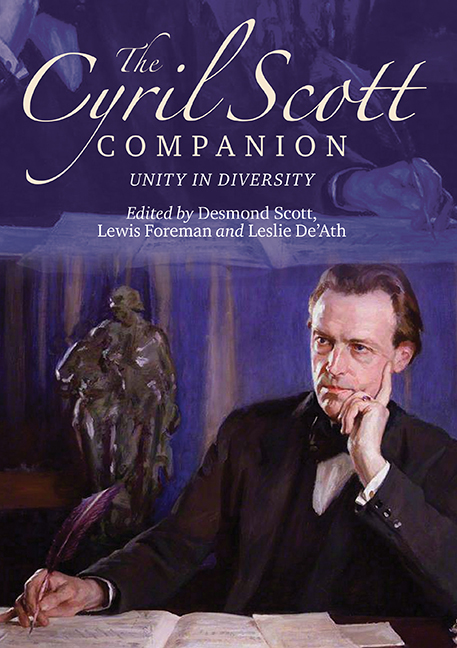Book contents
- Frontmatter
- Dedication
- Contents
- List of Illustrations
- List of Tables
- List of Contributors
- Foreword
- Preface
- Acknowledgements
- Editors' Note
- I SCOTT IN CONTEXT
- II THE MUSIC
- III THE WRITINGS
- 17 The Poetry
- 18 The Occult Writings
- 19 The Purpose of The Boy Who Saw True
- 20 Near the End of Life: Candid Confessions and Reflections: A Discussion of the Memoir
- 21 The Therapeutic Books
- 22 Childishness or The Moron Mind
- 23 A Note on the Plays
- IV PERSONAL REMINISCENCES
- APPENDICES
- CATALOGUES, DISCOGRAPHY AND BIBLIOGRAPHY
- Index of Works
- General Index
22 - Childishness or The Moron Mind
from III - THE WRITINGS
Published online by Cambridge University Press: 14 September 2019
- Frontmatter
- Dedication
- Contents
- List of Illustrations
- List of Tables
- List of Contributors
- Foreword
- Preface
- Acknowledgements
- Editors' Note
- I SCOTT IN CONTEXT
- II THE MUSIC
- III THE WRITINGS
- 17 The Poetry
- 18 The Occult Writings
- 19 The Purpose of The Boy Who Saw True
- 20 Near the End of Life: Candid Confessions and Reflections: A Discussion of the Memoir
- 21 The Therapeutic Books
- 22 Childishness or The Moron Mind
- 23 A Note on the Plays
- IV PERSONAL REMINISCENCES
- APPENDICES
- CATALOGUES, DISCOGRAPHY AND BIBLIOGRAPHY
- Index of Works
- General Index
Summary
CYRIL Scott produced five volumes all on the same subject. They are The Way of the Childish (1916); Childishness: A Study in Adult Conduct (1930), Man is my Theme (1939), The Rhymed Reflections of a Ruthless Rhymer (unpublished but completed c. 1943–4) and finally Man the Unruly Child (1953). In addition to these five books, there is another one to be considered: The Real Tolerance. The question arises as to what induced him to repeat the same basic premise for almost forty years? The answer could be he was so aware that the problems he pointed out in the first book had been totally ignored, as had his suggestions for resolving them; perhaps he saw himself as a present-day prophet crying in the wilderness, compelled to proclaim his warnings even though his audience was heedless to them.
Despite the devastation and horrors of World War 1, adults, Scott insisted, continued to behave like children. Could a post-war generation do better? The basic argument never alters. It can be summed up in a passage from The Way of the Childish:
Mankind has never grown up. With few exceptions, lost like needles in haystacks, the world is peopled by millions of souls who, despite their age and stature, behave like children in the nursery. The only difference is that, whereas the nursery behaviour of children may be on a small and comparatively harmless scale, the nursery behaviour of mankind is on an extensive and devastating one.
Scott published a number of books anonymously and sometimes a little detective work is needed to ascertain if he is the author. For instance, The Way of the Childish appears to have been written by Shri Âdvaitâchârya, but on the flyleaf below the title in smaller letters we find: ‘Written down by the author of The Real Tolerance’. Five years later, in 1921, it ran to a second edition, but this time the flyleaf read ‘Written down by the author of The Initiate’. Clearly both books were written by Cyril Scott.
The Way of the Childish is significant because it is the first notice we have of Scott's interest in theosophy. He explains that the book had been dictated to him and states: ‘The great Initiates, known as “Masters” in the Theosophical literature, instruct their pupils mostly from another plane but there are lesser Initiates who instruct them by word of mouth.’
- Type
- Chapter
- Information
- The Cyril Scott CompanionUnity in Diversity, pp. 371 - 380Publisher: Boydell & BrewerPrint publication year: 2018



